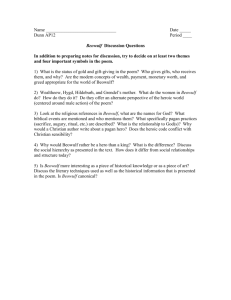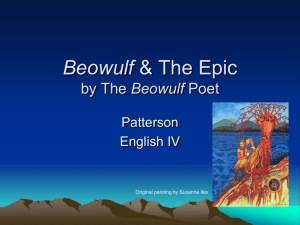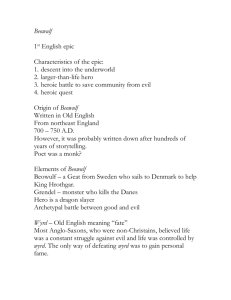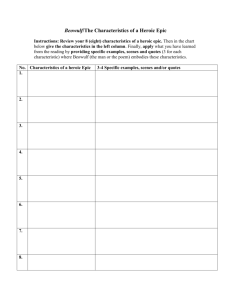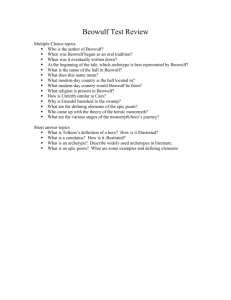Beowulf - Harris English
advertisement
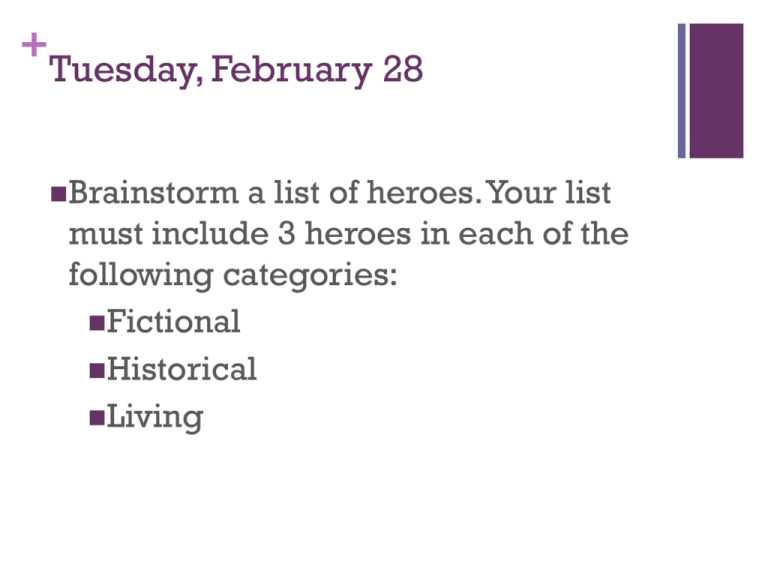
+ Tuesday, February 28 Brainstorm a list of heroes. Your list must include 3 heroes in each of the following categories: Fictional Historical Living + Announcement We will be in the computer lab on the long day. Assignment: 1. Beowulf Pt. 1 Type/Submit Personal Statement Due date is now 11:59 on your class period’s long day. + Beowulf Beo– Bear: Bears are known as Great Protectors in Norse mythology; strong Wulf– Wolf: Wolves are also great protectors, but are also cunning and speedy + History of the Text One copy of the text remains Scientists have dated the copy that exists to around 1000 AD Probably hand copied by two monks Preserved in a monastery Early 16th Century--the reign of Henry VIII put it in danger Survives probably by being taken into private collection Emerges in 1563, moved to Cotton and then to British Museum + What We Know Scholars have inferred: Consistent style suggests single author Use of conventional poetic devices suggest educated author Repeated phrases and formula words suggest oral composition References to God and Bible suggest Christian author Things that are still unclear: Place of origin: Studying Anglo Saxon dialect has been inconclusive Date of poem: Anywhere from 700-1000 AD Details about the author: Scop? + Literary Device/Term Review Allusion: Biblical, Germanic oral tradition, Norse myth and legend, historical Anglo-Saxon kings (eg. King Offa of Mercia) Alliteration (eg. Scyld’s strong son) Epic poetry: a long narrative poem written in elevated style which celebrates the deeds of a legendary hero or god. Kenning: two-word metaphorical name for something (eg. whale-road=sea, mankind’s enemy = Grendel) Caesura: A pause dividing each line of poetry, with each part having two accented syllables to help maintain the rhythm of lines. Scop: Anglo-Saxon composers and storytellers. Hero: A legendary figure who performs deeds requiring incredible courage and strength. + Anglo Saxon World Roman roads and oxcarts Villages = wooden houses Communal farmland Stone churches Soldiers in armor Mead halls--communal banquet halls Harsh Environment: War, Few comforts Religion: Gods = neither all good nor all powerful + Background Beowulf was written in Old English, an early form of English (Check out Beowulf in Old English.) Old English was spoken in the Middle Ages from about 6th century to 11th century CE In 1066, William the Conqueror successfully invaded England, bringing his Norman French language with him; the nobility began to speak French, and gradually Old English evolved into Middle English like in Canterbury Tales (11001500): “Whan that Aprill, with his shoures soote/The droghte of March hath perced to the roote” Modern English has been spoken since the Renaissance – Shakespeare is NOT Old English; he is Early Modern English + Background Composed around 700 A.D. The story had been in circulation as an oral narrative for many years before it was written. The action of the poem takes place around 500 A.D. Poet is reviving the heroic language, style and values and pagan values of ancient Germanic oral poetry The poem deals with ancient Germanic forebears, the Danes and the Geats Only a single manuscript of the poem survived the AngloSaxon era. In the 1700’s it was nearly destroyed in a fire It was not until 1936 when the Oxford scholar J.R.R. Tolkien published a paper on the poem that is became popular. The Beowulf Poet The poet is Christian The poem reflects established Christian tradition Allusions to the Old Testament Think: What’s an allusion? Beowulf is a Redeemer who is sent by God to save man from sin Sound familiar? The price of salvation is life itself Correspondences between Beowulf’s death and the death of Christ Heroic Values in Beowulf Relationship between king and his warriors The king rewards his warriors with gifts If a kinsman is slain, obligation to kill the slayer or obtain payment (wergeld) in compensation The Character of Beowulf He fights for personal honor, but is committed to service to his own people and humanity. A superhuman who remains recognizable Contrast Beowulf Beowulf Beowulf old and young as savior was a war leader of the Geats, a group of people in what is now southern Sweden + Antagonists Grendel’s Mother Grendel The Dragon Themes Good vs. Evil Fate The Importance of Establishing Identity Tension between Heroic Code and Christianity Significance The past of artifacts + Elements of an Epic Poem Epic hero– an character with a trait or characteristic that is valued by his society. (E.g.– Superman’s bravery or valor) Quest– A journey through which the character or the reader learns something Valorous Deeds– Doing something bravely. Divine Intervention– The hand of God (or gods) help the hero, proving his value. Great events– The hero has a hand in something important in the history or mythology of a culture.

